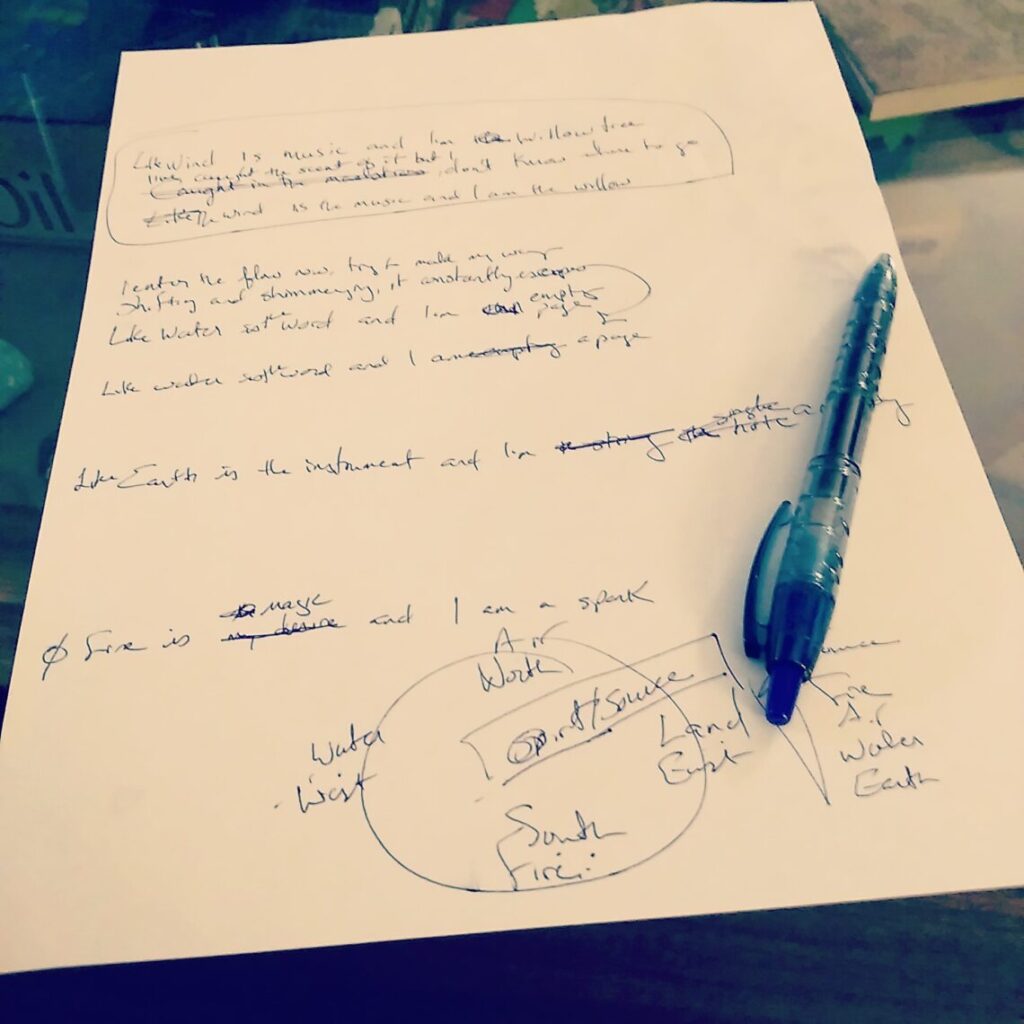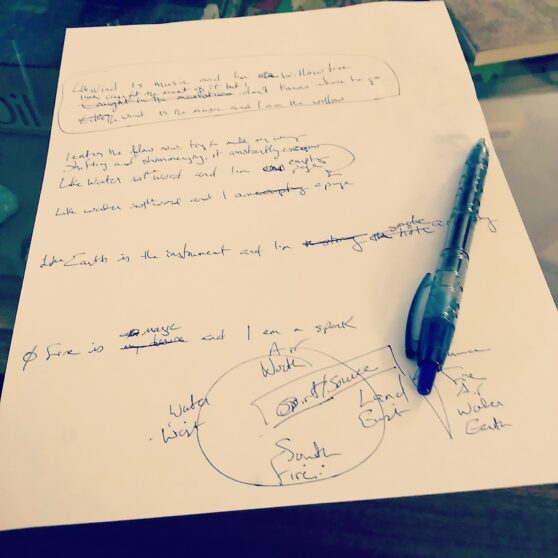
Years ago, I helped start a writers’ group.
Just a small bunch of friends who got together once a month and talked about writing. It was fantastic, and helped me with my writing so much. When I moved here, I looked for other opportunities. I actually helped to start two songwriters’ groups here, and they are the best kind of wonderful.
There is one member of both groups, actually, Susan, who has been incredibly helpful in terms of fearless feedback, inspiration, ideas, and problem solving. Several of the songs I’ve written in the past 3 years have greatly benefited from having her think about them a minute. Some would never have been finished without her. And we’ve co-written a few songs now, too, which have become some of my favorites. I always look forward to her feedback, and in fact now I just send her stuff automatically, because the feedback is always so good. She’s not afraid to ask the hard questions, or to push aside the sacred cows to get to a better story or a stronger song.
A few weeks ago, I mentioned in a post that I had started a novel about cats way back in 2014 when I was fighting my way back from depression, and that I hadn’t finished it because it served its purpose by bringing me back, so I didn’t feel like I had to. Well, Susan had a very different take on that, and strongly encouraged me to finish the damn cat book. So I drug it out and I finished the story, and then I gave it a round of corrections and revisions and sent it to her to read.
The feedback I got was astoundingly good, and it’s going to make this book so much better. She knew what was missing, she knew what was wrong with a couple of the things that I couldn’t figure out. I printed out all her feedback (3 wonderful pages!) and put it in the binder with the current version of the story so I can start on Draft 3. I’m going to take Judy Blume’s advice, though, and wait for a bit before I start, because you have to let it rest and settle. You have to let your mind sift through everything and figure out how you’re going to tackle it. It’s going to require a nearly complete re-write, and that’s fantastic. It’g going to require writing out a few characters, but that’s alright. That will allow me to fully develop some of the ones I didn’t do justice to.
Do you have a group of inspiring people who are great at doing what you love that you can turn to for feedback, inspiration and advice?
I hope you do, but if you don’t, I recommend that you start one. Not eventually, now. Trust me, you need this. Every creative bone in your body will thank you, and there are a lot of creative bones in there. It’s actually quite easy, because most people are hungry to talk creative-shop with people they like. After one meeting, the feeling of sheer bliss and affirmation and accomplishment and satisfaction will keep everyone coming back for more.
There are a few things I have learned from belonging to a few and starting a handful of writers’ groups. Here they are, so you can learn from what has worked for me.
- Limit it to only as many members as you have time for. We started the Small But Mighty Songwriters with about six or possibly seven, and it has gone up and down from time to time, but we’re maybe around nine now. If everybody has something to share, it takes between 90 minutes and two hours to get through, and that’s pretty manageable. But most times, one or two of us don’t have anything so it all works out. I belonged to a writers’ group that had 30+ members, and it was really rushed and awkward and never warm and fuzzy. Keep it secret, keep it safe.
- Invitation only. This is not a public event. We wanted to make sure we had people who were going to be serious about writing, who had written at least a few songs before, and who wanted to work with like-minded others to get better at what they love to do. We don’t have time for people who aren’t serious about it. And by serious I don’t mean wanting to be on the cover of the Rolling Stone. I mean seriously wanting to improve at their craft because it makes them happy.
- Keep feedback constructive, relevant, and kind. No going off on tangents about you, no judgments, no getting offended. We all agreed at the beginning that we weren’t gonna get offended by content, that political songs or songs with profanity were fair game. Fortunately, all of the members we’ve ever had seem to be on the same page politically, and none of us are afraid of a four letter word or two. But this is important. If you can’t listen to things that could make you a little uncomfortable, then you either need to not do this or get over your tiny self.
- It’s not all about you. In fact, most of the time it’s about one of the seven or so other people in the room. If you have to be the center of attention, this is not going to be a good fit for you. We have worked hard to keep that vibe out of our group. Everybody knows, when the time for feedback comes, it’s focused on the song, it’s never personal, and it’s not an excuse for anybody to tell anecdotes about themselves. This is really one of the most important things – it’s not about ego and it’s not about making connections or getting into somebody’s gig pants. That kind of stuff will get you invited to not come back.
- Collaborate within the group to learn from each other. Every time I collaborate I learn something, whether it’s a new way of putting words together or a new way of researching songs, or a different style of melody writing, or whatever. It’s one of the best ways to get better at what you do. Also, collaboration takes you one step away from the subject, and that can free you up to write things you might not ordinarily have the guts to say – which then pushes you outside your comfort zone and allows you to reset your boundaries a little bit. Makes that comfort zone just a little bigger, which is a very good thing. We will often do challenges in the SBMSongwriters, like a “line exchange,” or a prompt of some kind. Somebody will see something in the news and say, “Let’s all write a song about that,” or we’ll pick a phrase – one was “a blade of grass” – and everybody writes a song about it. One year over the holidays we did a “Secret Santa Line Exchange,” where everybody sent a single line they came up with in to one person, who put all the lines in a hat and drew them out to assign them to other writers. We did a reveal in our December meeting, with snacks and wine, and it was an incredible amount of fun.
- No shame for those who are letting their fields lie fallow. We all go through dry spells, when we have to rest and recharge. I went almost a year without writing a single song, and the group was nothing but kind and supportive. Collaboration ended my dry spell, and it’s wonderful to have people you can trust to help you get through that.
We need connection, even us introverts, or maybe especially us introverts. We need deep connections with creative people who resonate deeply with us. It instantly makes you better. It gives you gentle accountability, because you want to have something to share – but when you don’t it doesn’t ever, ever shame you. I highly encourage you to seek one out, or start one. Creatives are often shy and don’t know just how incredibly gifted they are. A writers’ group is one of the biggest confidence boosts out there. Go get it.


A novel? And cats? I can’t wait!!!